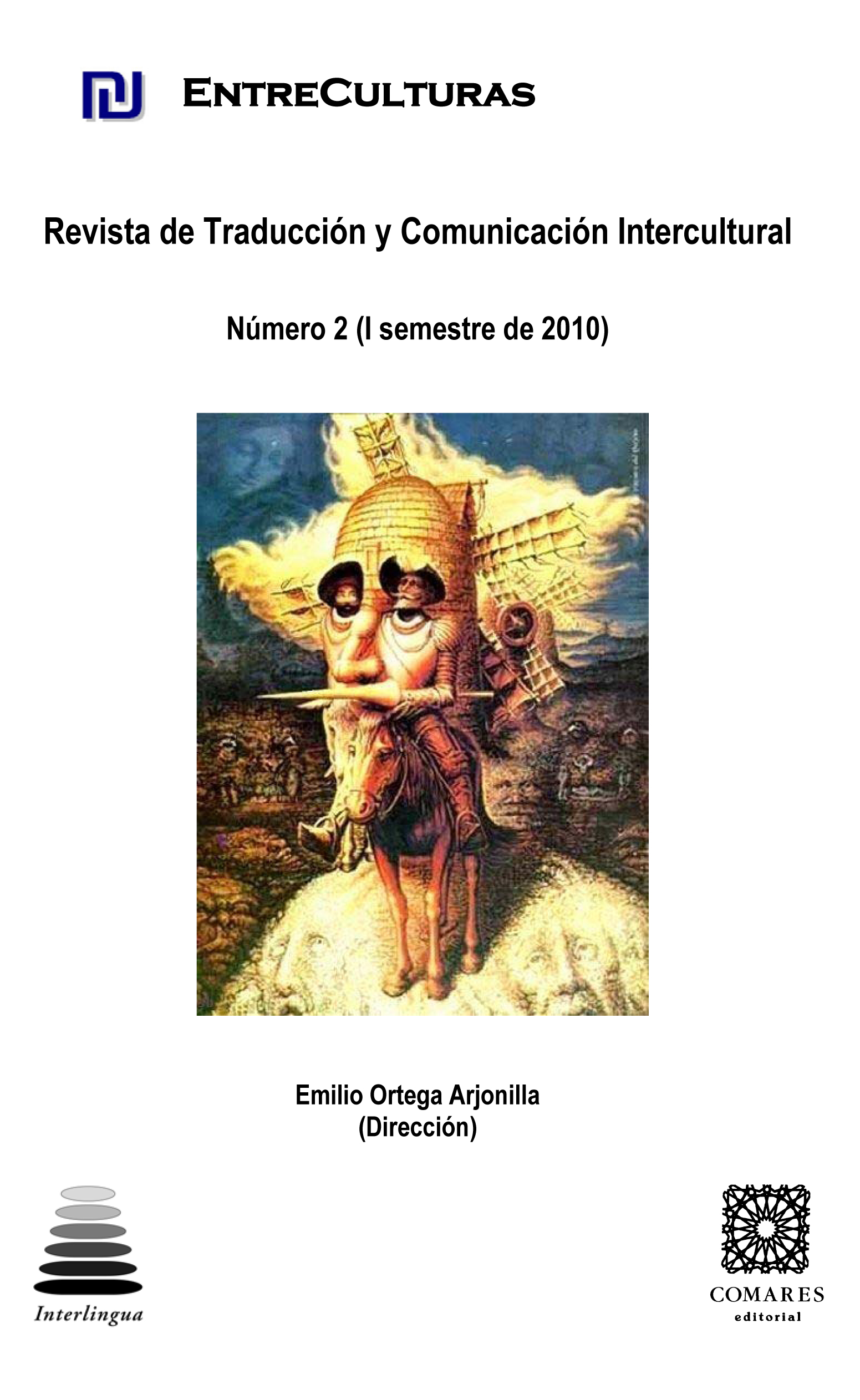DIS/PLACING TERRITORIES OF IDENTITY IN TRANSLATION
DOI:
https://doi.org/10.24310/Entreculturasertci.vi2.11755Keywords:
Translation, identity, linguistic imbalancesAbstract
In translation change is effected not only in a quantitative and tangible way but in a qualitative and intangible one as well. The linguistic and cultural differences that translation realizes in the process of rewriting oftentimes displace identities and project into them new singularities. As translation facilitates the creation of new territories of identity, the existing ones must evolve as host languages and cultures, which can lead to imbalances of power. How translations introduce these changes and the manner in which identities react as a consequence are the object of this essay.
Downloads
Metrics
References
BACCHILEGA, C. y N. ARISTA. (2007): “The Arabian Nights in the Kuokoa, a Nineteenth-Century Hawaiian Newspaper: Reflections on the Politics of Translation” en Marzolph, U. (ed.): The Arabian Nights in Transnational Perspective. Detroit, MI, Wayne State University, 157-182.
BETHELL, C. et al. (2003): “Measuring and Interpreting Health Care Quality Across Culturally-Diverse Populations: A Focus on Consumer-Reported Indicators of Health Care Quality.” FACCT- Foundation for Accountability. http://www.markle.org/resources/facct/doclibFiles/documentFile_592.pdf
BHABHA, H. (1997 [1994]): The Location of Culture. Londres/Nueva York, Routledge.
DIAZ, J. (2007): The Brief Wondrous Life of Oscar Wao. New York, Riverhead Books. Trans. Obejas, A. (2008): La breve y maravillosa vida de Óscar Wao. Nueva York, Vintage Español.
FENTON, S. y P. MOON (2002): “The Translation of the Treaty of Waitangi: A Case of Disempowerment” en Tymoczko, M. and E. Gentzler (eds.): Translation and Power. Amherst/Boston, University of Massachusetts, 25-44.
GUPTA, P. (1998): “Post- or Neo-Colonial Translation? Linguistic Inequality and Translator’s Resistance”. Translation & Literature, 7.2, 170-193.
HATIM, B. e I. MASON. (2000): “Politeness in Screen Translating” en Venuti, L.(ed.): The Translation Studies Reader. Londres/Nueva York, Routledge, 430- 445.
HICKEY, L. (2000): “Politeness in Translation between English and Spanish.” Target, 12:2, 229-240.
HOFMANN, S. (2006): “The Importance of Culture in Cognitive and Behavioral Practice.” Cognitive and Behavioral Practice, 13:4, 243-245.
KENAN, L. (2002): “Translation as a Catalyst for Social Change in China” en Tymoczko, M. y E. Gentzler (eds.): Translation and Power. Amherst/Boston, University of Massachusetts, 160-183.
MACK, M. (2002): “A note on translation” en The Norton Anthology of World Literature. The Twentieth Century. Nueva York/Londres, W. W. Norton & Company, A1-A12.
MEIFANG, Z. y V. LEI. (2004): “The Post-Colonial Translation Movement in Macao.” (Abstract). IATIS. http://www.iatis.org
PÉREZ REVERTE, A. (1988): El maestro de esgrima. Madrid: Santillana. Trans. Jull Costa, M. (1998): The Fencing Master. Nueva York, Harcourt Books.
SILVA, N. (2004): Aloha Betrayed. Durham, N.C., Duke University.
SPIVAK, G. (2000): “The Politics of Translation” in Venuti, L. (ed.): The Translation Studies Reader. London/New York, Routledge, 397-416.
VENUTI, L. (2005): “Local Contingencies: Translation and National Identities” en Bermann, S. y M. Wood (eds.): Nation, Language, and the Ethics of Translation. Princeton/Oxford, Princeton University Press, 177-202.
? (1998): The Scandals of Translation. Towards an Ethics of Difference. Londres/Nueva York, Routledge.
YIFENG, S. (2008): “Opening the Cultural Mind: Translation and the Modern Chinese Literary Canon”. Modern Language Quarterly, 69:1, 13-27.
Downloads
Published
How to Cite
Issue
Section
License
All contents published in Entre culturas. Revista de traducción y comunicación intercultural are protected under the Creative Commons Attribution-NonCommercial-ShareAlike 4.0 International (CC BY-NC-SA 4.0) license. All about this license is available in the following link: <http://creativecommons.org/licenses/by-nc-sa/4.0>
Users can copy, use, redistribute, share and exhibit publicly as long as:
- The original source and authorship of the material are cited (Journal, Publisher and URL of the work).
- It is not used for comercial purposes.
- The existence of the license and its especifications are mentioned.
There are two sets of authors’ rights: moral and property rights. Moral rights are perpetual prerogatives, unrenounceable, not-transferable, unalienable, imprescriptible and inembargable. According to authors’ rights legislation, Entreculturas. Revista de traducción y comunicación intercultural recognizes and respects authors moral rights, as well as the ownership of property rights, which will be transferred to University of Malaga in open access. The property rights are referred to the benefits that are gained by the use or the dissemination of works. Entreculturas. Revista de traducción y comunicación intercultural is published in an open access form and it is exclusively licenced by any means for doing or authorising distribution, dissemination, reproduction, , adaptation, translation or arrangement of works.
Authors are responsable for obtaining the necessary permission to use copyrighted images.





7.png)
